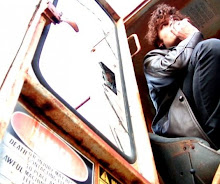Within the excerpts from Camera Lucida, Barthes attempts to (almost desperately) find meaning and significance within the photographic medium, and justify why it should stand alone as an art form within the visual community. His initial process begins from an analytical, deconstructive stance, attempting to break down the craft as a whole. It seems that only with the death of his mother does this process take on an emotional stance, and consider the role of context, in my opinion a much more appropriate perspective when contemplating the meaning behind any creative endeavor.
Although his initial argument is far from linear, he seems to think photography is devoid of any meaning outside of what is directly portrayed, that the object and the meaning are as one, " A pipe here, is always and inextricably a pipe. It's as if the photograph always carries its referent with itself, both affected by the same amorous or funeral immobility." What he fails to consider at this juncture is the role of context, within and without the confines of the image. A hammer for example, in different contexts: a hammer hanging in a hardware store display window, above it a sign reads "Out of Business"; a hammer in the hands of a child, his father watching over proudly; a hammer in the hands of a rampaging killer. All these images incorporating the same object, illicit different emotional responses. Then there's the context the observer places upon the object, we all know the proposed definition and purpose of a hammer, but likely have varied memories and associations attached to the object.
I think Barthes comes closer to the point though later in the reading, when trying to connect with photos of his recently deceased mother, finding only fragments of familiarity in each photo. He points to history as a source of division; as long as we still exist, we are not a part of history, if we had yet to exist, again, we are not apart of this history. This is where he begins to truly consider context, looking at photos of his mother in a time and place he had no context for, they were unfamiliar, and not the mother he knew and loved. But ironically, in his search for the perfect, all encompassing photo of his mother, he found it in the distant past. His mother as a mere child, unabashedly displaying all of the characteristics that composite her being. I think his connection to this photo speaks of several truths; while considering the arts, and trying to feel something from them, context, and our ability to relate to them, are indeed important factors, but at the same time, the arts, whether it be a photograph, a song, or a painting, often have the unique ability to make us feel something deeply emotional, and inherently human, for something we ourselves have no context for. And I think oftentime, if we are lucky enough to experience this catharsis, it may be best to bask in it rather then attempt its deconstruction.
Thursday, September 23, 2010
Subscribe to:
Comments (Atom)

